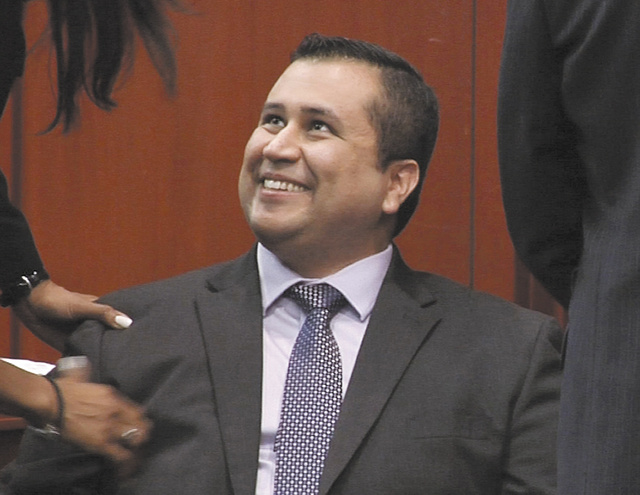SANFORD, Fla. – It’s over.
But it’s not really done.
The not-guilty verdict that sounded so final, so utterly unequivocal Saturday night has quickly given way to demonstrations across the country, debate about wrongful-death lawsuits and demands for the filing of federal civil rights charges.
On Saturday night, George Zimmerman was able to shed the GPS that had monitored his movements before he was acquitted of manslaughter and second-degree murder charges in the death of teenager Trayvon Martin. But just hours later an NAACP petition asking the Justice Department to file civil rights charges against Zimmeran received such a massive response that it crashed the orgnization’s website.
The Justice Department then released a statement saying its civil rights division still had an open investigation into Martin’s death, dating back more than a year. Working with the FBI, federal prosecutors are reviewing evidence gathered during a Justice Department investigation — and revealed during the Seminole County trial — to see whether the case fits within “the limited federal criminal civil rights statutes,” the statement said.
Such is the cramped and rolling nature of this spectacle that Attorney General Eric Holder is scheduled to address the NAACP’s annual convention Tuesday in Orlando, Fla., just a short drive from the courthouse where the verdict was read.
Zimmerman, who has a white father and a Peruvian mother, claimed self-defense in the death of Martin, an unarmed African-American teenager he saw walking through his modest gated community in February 2012. Zimmerman said he shot Martin after the teenager sucker-punched him and started pounding his head into a concrete walkway. Zimmerman had a concealed-carry permit for the handgun he used that night.
“I think it was racial profiling,” Barbara Arnwine, executive director of the Lawyers Committee for Civil Rights Under Law, said in an interview Sunday shortly after arriving in the Orlando area.
Arnwine said that she met with Justice Department officials before Zimmerman’s arrest in hopes of persuading them to file civil rights charges and that she would renew the push now that Zimmerman has been acquitted by a six-woman jury with no African-American members.
However, doubts have been expressed by at least one Martin family attorney about the viability of a civil rights charge. In an interview with the Washington Post during the trial, attorney Daryl Parks said, “There was not enough evidence to say that (Zimmerman) made this decision based on race. . . . On the facts of this case, you can’t say it was based on race.”
In closing arguments and in a news conference after the verdict, prosecutors insisted that the trial was not about race. Arnwine criticized prosecutors for taking that approach. Her targets included State Attorney Angela Corey, who was appointed by Republican Gov. Rick Scott.
“What did she think it was about?” Arnwine said. “I do think that the case did show that the prosecutors did not have a good strategy for dealing with the racial element of the case,” she said.
Florida defense lawyer Diana Tennis argued in an interview that “if anybody has a civil rights action, it’s George Zimmerman.” Tennis said that “black leaders and black lawyers got him maliciously prosecuted” by pressuring local politicians during the month and a half between the shooting and Zimmerman’s arrest. Zimmerman, she said, is “the one who might end up in federal court asking a lot of embarrassing questions to a lot of shame-faced politicians.”
Rallies — including a large demonstration organized by the Rev. Al Sharpton in Sanford — were held nationwide to protest the initial decision of Sanford police not to charge Zimmerman. And the Martin family’s lead attorney, Benjamin Crump, who is African-American, mounted a successful campaign to generate media interest in the case, along with the help of a public relations firm and other lawyers.
Zimmerman’s attorneys are poised for the possibility of civil lawsuits against their client. Defense attorney Mark O’Mara has said he will seek immunity for Zimmerman if civil suits “spawned by this fiasco” are filed.
Tennis said the defense pursued a pretrial strategy that seemed designed, at least in part, to avoid any risk of not being able to claim immunity in future civil lawsuits. The defense opted against asking the judge to dismiss the case based on Florida’s “stand your ground” law, which in many cases justifies the use of deadly force, without the obligation to flee, when a person feels threatened.
If the judge had refused a dismissal on those grounds, Zimmerman might not have been able to claim immunity later, Tennis said.
“They took a gambit,” she said. “I think they were looking forward.”
She noted that even though Zimmerman is not wealthy now, he may be able to strike lucrative book deals that would generate income that could potentially be at risk in a civil suit.
The legal standard in a civil lawsuit is lower — a preponderance of the evidence, rather than proof beyond a reasonable doubt.
Comments are not available on this story.
Send questions/comments to the editors.


